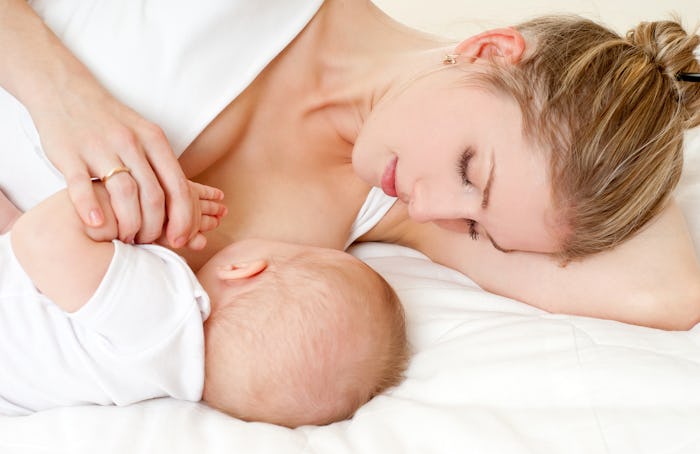Life

Is Breastsleeping Safe? Yes, If You Follow Safe Guidelines
Breastsleeping may sound like a term that relates to the myth about sleeping in a bra to keep your boobs perky, but it's not. Instead, it's a decision parents are making all over the world so they can do what's best for them and their baby. But is breastsleeping safe?
According to research from Dr. James McKenna, director of the Mother-Baby Behavioral Sleep Laboratory at University of Notre Dame, and Dr. Lee Gettler, breastsleeping is the act of breastfeeding your baby and bed-sharing at same time. It's a parenting choice that is pretty common in other cultures across the world and was once the only way to put your baby to sleep. In fact, McKenna argued that there is no breastfeeding and there is no infant sleep — there is only breastsleeping.
It sounds great, right? You don't have to fully wake up to feed your baby, your body is in tune with your little one's needs so you are right there for them, and it means more sleep for everyone. But is it safe? According to the American Academy of Pediatrics (AAP), bed sharing is reportedly the greatest risk factor for sleep related infant deaths. So how can breastsleeping be considered safe?
Dr. Cecilia Tomori, anthropologist with postdoctoral training in public health, Research Associate at the Johns Hopkins Bloomberg School of Public Health, and author of Nighttime Breastfeeding: An American Cultural Dilemma tells Romper that if you're thinking about the safety of breastsleeping, you have to think about the framing of McKenna’s and Gettler’s argument. "The context of sleep and its environment is key here," she says. "They are discussing breastsleeping when practiced "in the absence of all known hazardous factors." So we need to think about this very carefully — they are assuming exclusively breastfeeding a full-term, healthy infant on a firm surface (never the couch or sofa), without any soft bedding that can entrap or cover the head of the baby." She also notes that the assumption is that there is no type of substance involved that can make the parent impaired, like smoking, impairing medications, or alcohol.
But Tomori also says that the actual act of breastfeeding is what contributes to breastsleeping's safety, too. She says:
Breastfeeding mothers are physiologically attuned to their babies — breastfeeding is part of complex physiological coordination between mothers and babies that includes touch, breathing, temperature regulation, heart rate, sleep cycles, and a whole host of processes that are taking place at the same time, This proximity played a key role in enabling human infants, who lack the capacity to fully regulate their bodies, to survive. Does this mean that this system ensures that mothers are always able to spot when something is wrong? No, it does not. But it is quite a robust system. In fact, breastfeeding and sleeping next to babies remains very common cross-culturally and in many groups in the U.S. as well, and was the historical norm for most people around the world.
Breastsleeping seems to be the best of both worlds — you get more sleep, your baby gets what they need, and everybody wins. But Tomori says this is not a blanket recommendation. "Breastsleeping is the recognition that evolutionary mechanisms underlie why so many breastfeeding parents find themselves sleeping next to their babies regardless of their intentions," she says. "So we need to help parents understand what is happening and how to minimize any potential risks involved. For some parents, this will mean that they will do this in the context of breastsleeping, while for others it may involve sleeping within arms reach of their babies."
Whatever your choice is, know that if you decide to try breastsleeping, you should follow the guidelines that Gettler and McKenna have assumed you are already following when they conducted their research. No hazardous objects, no pillows, no blankets to entrap a baby, and that your little one is healthy and you are fully aware of what's going on around you. This check list will add up and could make all the difference in breastsleeping being a safe choice or not.